Perhaps you reside in a one-room apartment or an industrialized hub where ample space is luxury. Your options for workout tools may be limited because of space. And even if yours is a large apartment, you may still prefer your floor space to be free. In that case, Tonal and Mirror are two workout machines you are probably considering; they don’t require as much space as a
treadmill
or one of these exercise bikes because they are just slightly bigger than your TV and usually hung on the wall.
But while both machines appear to be similar in their looks and where they are placed, they are different functionally and in the fitness goal, they help you achieve. While Mirror helps to stream live and recorded workout sessions, Tonal is a cable machine that has a digital weight system. In deciding which is better for you between these two tools, your primary focus will be how you want to work out. Tonal targets building strength, while Mirror focuses on group fitness and cardio.
Tonia vs. Mirror: Specs Compared
|
|
|
|
|
|
24 inches |
43 inches |
|
|
150 lbs |
70 lbs |
|
|
$3,495 |
$1,495 |
|
|
$49 |
$39 |
|
|
50.9 x 21.5 x 5.25 inches |
52.6 x 21.1 x 1.7 inches |
|
|
7-10 business days |
7-14 business days |
|
|
Professional installation requires payment which is subject to location |
No need for professional installation. But if you insist, a $250 fee applies. |
About Tonal Wall Workout Machine
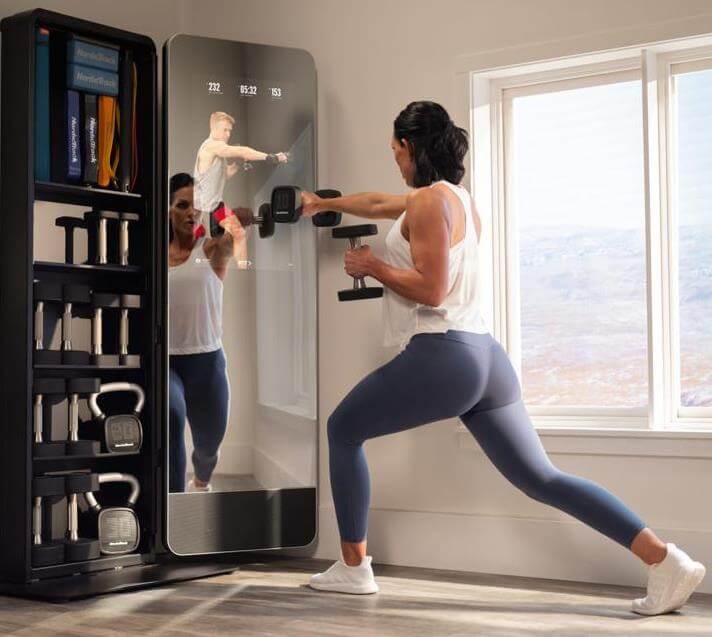
Tonal’s arms are adjustable and have attached cables that function by electromagnetic resistance. You can enjoy over 100 exercises, such as bicep curls, lat pulldowns, and deadlifts, with this mirror machine by attaching the right accessories and handles to it. One arm of this device offers about 100 lbs of resistance; its touchscreen provides easy browsing of tons of workout sessions plus real-time monitoring of your workout progress. You can either opt for any of its live classes or hook up with past sessions that have been recorded and saved.
With about 17 built-in sensors, this smart gym machine can automatically check the correctness of your form and offer valuable suggestions on what you can do for improvement. The more you work out with this machine, the more information about your movements, balance, strength, and flexibility it gathers so it can better help you with suggestions to help achieve your fitness goal. While it cannot replace a physical trainer, it supplies as much help as you would get from one.
The Pros and Cons of Tonal
|
|
|
|
The monthly subscription covers unlimited household profiles, ensuring that each person can keep their stats and preferences |
You have to buy its smart accessories separately, thereby incurring more costs |
|
Myriads of weight suggestions for recorded workouts, live classes, and personalized programs. |
The machine is quite expensive, almost twice the price of the Mirror |
|
Effective tracking of motion range, reps, volume, power, sets, tension time, and other details to evaluate progress per time. |
It needs ample wall space for hanging (7ft by 7ft) |
|
Plethora of smart accessories to expand the range of activities possible with the machine. |
The mirror is also heavier than its competitors |
About Mirror Wall Workout Machine
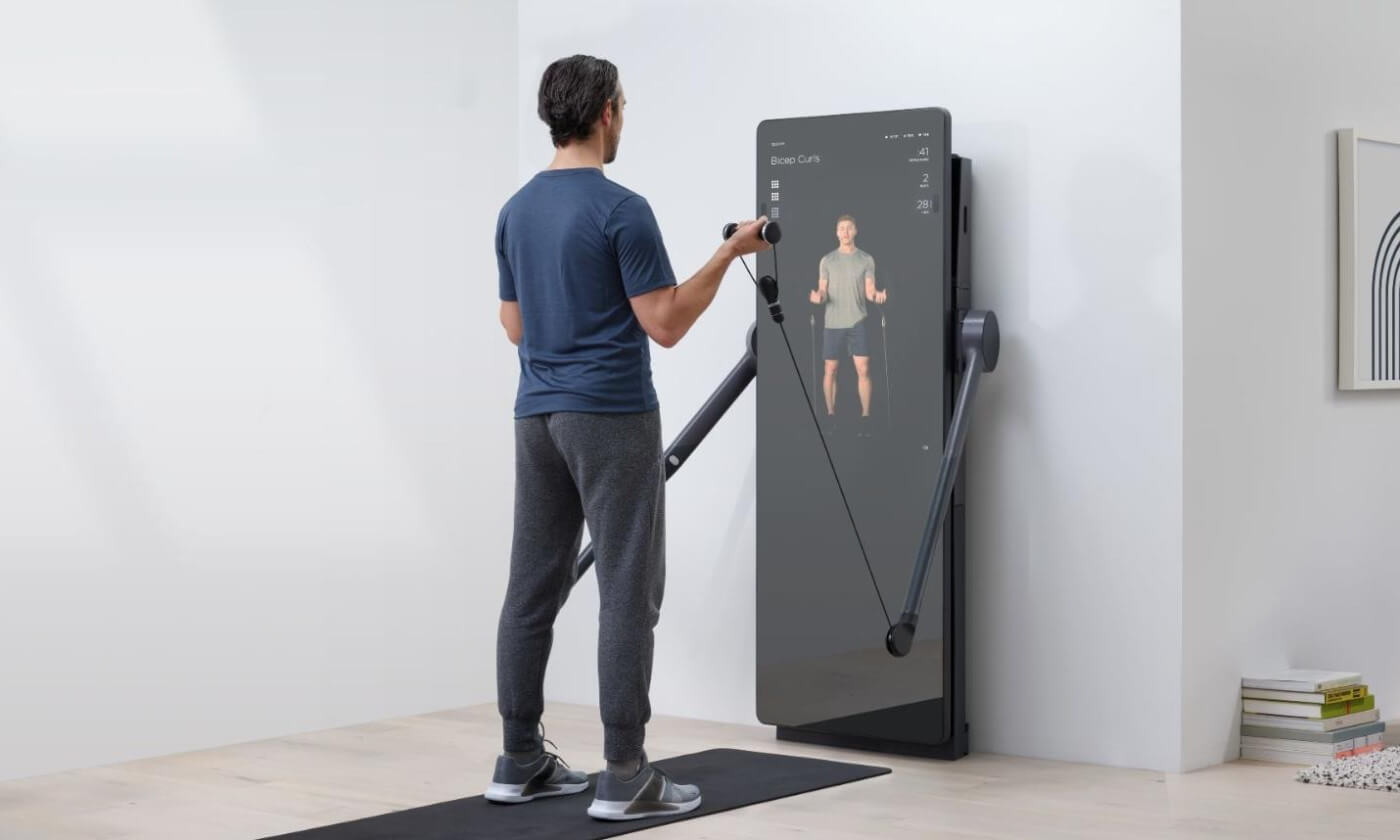
Image Source: Mirror
Lululemon
owns Mirror, and its emphasis is on cardiovascular endurance and fitness coupled with mobility. With your membership subscription, you can access many high-intensity training like pilates, yoga, kickboxing, HIIT, bodyweight exercise, and meditation. Compared to Tonal, which emphasizes strength, this cardio machine is lighter, weighing only slightly above 70 pounds.
The downside is that there are no weights or smart dumbbells in the box; you would have to purchase them based on your needs. The add-ons you can use are typically between one and 30 pounds in weight for them to pair accurately with the ankle weights that come with this machine.
As with Tonal, the smart accessories you purchase with your Mirror machine can track your exercise progress using their sensors. However, since the maximum per-arm weight of this machine is 35 lbs, you can’t get as much electromagnetic resistance as Tonal provides. Mirror’s library is, however, massive, having more than 10,000 classes, with new ones springing every day.
The Pros and Cons of Mirror
|
|
|
|
The design is simple, minimalistic, and easy to set up without professional assistance |
Most accessories are sold separately and, therefore, increase the money spent on them. |
|
The library is super rich, with more than 10,000 classes and counting |
The mirror doesn’t feature a touchscreen |
|
There is the option to work with an actual human trainer for personalized training. |
The compulsory one-year subscription is pocket-demanding |
|
Multiple users (up to six) can share a mirror |
Differences Between Tonal And Mirror Wall Workout Machines
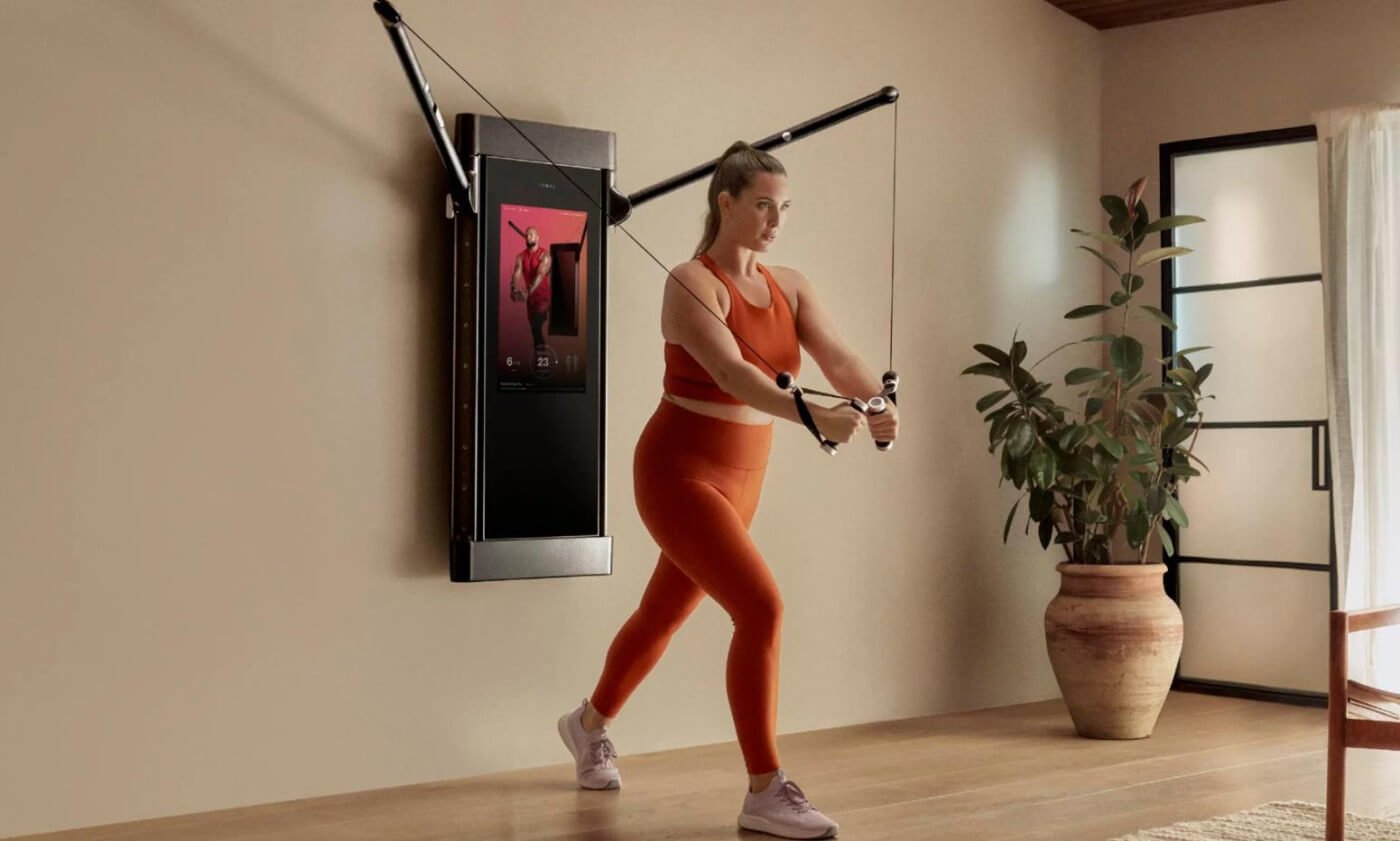
The design of Tonal is such that users will experience strength workouts, which is why the manufacturer included two in-built resistance arms in its fabrication. With these arms, you can cover at least 200 exercises by adjusting them. Each exercise round also provides a resistance of as high as 200 pounds. Tonal is, therefore, a better wall workout machine for anyone who loves weight lifting and versatile machines.
Conversely, you won’t find in-built resistance in Mirror, although it’s possible to purchase and integrate one. Its build is such that people seeking cardiovascular fitness will find it beneficial. Consequently, you can sync your
Wearable Heart Rate Monitor
with Bluetooth. It also allows access to online coaching, where a trainer can put you through many workout sessions as you require.
Tonal vs. Mirror: Which is Better?
Now that we know that both machines help to achieve different goals, which of them can we say is better? Of course, it’s evident that both are fitness machines and are hung on the wall. Nevertheless, we will consider a few parameters to see which provides a better sense of satisfaction than the other
-
Hardware Composition: Tonal is Better
The physical interaction that Tonal commands is unmatched by Mirror. With its dual adjustable arms, each providing up to a hundred pounds of electromagnetic resistance, you can get a combined 200 pounds, as opposed to Mirror’s 70. Besides this, Tonal’s attachments are swappable; just like most machines, users can bring third-party attachments on board.
Still, on Tonal, the machine features a vertical touchscreen that is 24 inches in length from which users can view lifting instructions, workouts, stats, and other details. This touchscreen comes pre-built with speakers, a webcam, Wi-Fi, and Bluetooth. While enough has been said about how Tonal takes so more space than Mirror, the fact is that when not in use, it doesn’t. The only serious consideration for Tonal, which is also a drawback, is that you need a professional to install it. Also, the wall must meet Tonal’s Wall Requirements, which is central because it must be metal or woody studs separated by 16-24 inches.
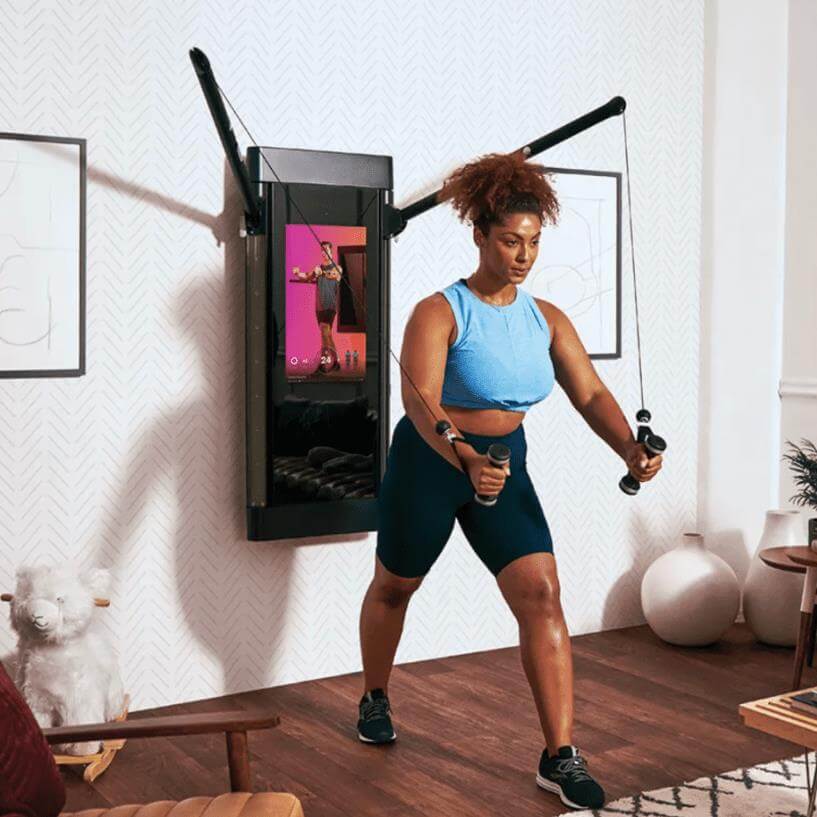
Conversely, Mirror doesn’t offer physical interactions as Tonal. It also doesn’t feature a touchscreen. The vertical screen is 40 inches tall and can be controlled using a companion app installed on the user’s phone. When you aren’t using this machine, the app won’t be visible on your phone. Mirror works like a personal trainer by motivating you, suggesting fitness workouts, and, if you subscribe, linking you up with a human personal trainer. It, however, edges out Tonal by not having a rigid space requirement for hanging.
-
Rental and Relocation Purposes: Mirror is Better
Given the versatility and lightweight of Mirror, it’s the renters’ choice. Besides, there is a floor-standing option that you can move at will. For Tonal, if you relocate or want to have it installed elsewhere, you have to call the professionals back to uninstall and transport it to the new location. All of these cost money, which is not less than $200 at the minimum.
-
Content Selection: Mirror is Better
When you first purchase any of these two workout devices, you would be required to pay for a year’s subscription to gain access to their respective content. After the first annual subscription, you can opt for the monthly subscription or back off completely. While Tonal costs $49 per month, Mirror costs $39. You can control both machines with their companion apps on your phone’s OS app.
The Mirror wall workout machine outperforms Tonia in this department because of its build. As a machine primarily made for streaming recorded and live sessions, it has more content than Tonia. While it is slightly cardio-heavy, it has other contents that are not cardiac-related. To crown it all, you can access up to 20 live classes daily, with the option to leave your selfie as motivation for others.
Since Tonia is primarily weight-focused, it doesn’t have all the paparazzi that Mirror showcases. Its selections, such as kickboxing, cardio, strength workouts, and
yoga
, are, nonetheless, very impressive. The machine also makes on-demand live classes available, although not as many as Mirrors. You can use Tonia without subscriptions, but you won’t be able to access its premium content.
-
Price: Both are Expensive
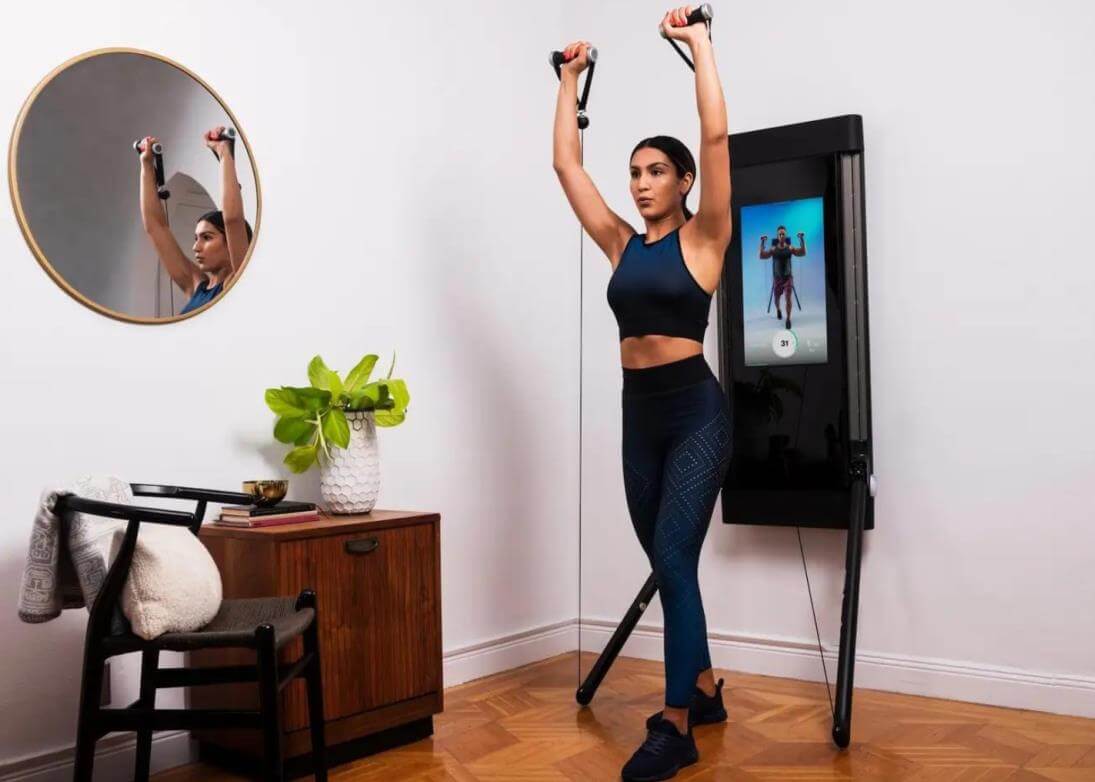
Agreed; Mirror is not as expensive as Tonal. However, neither of the two machines is close to being cheap. Tonal alone sells for $2995 if we exclude the $250 professional installation fee and $495 for its smart accessories. Of course, there is still the $49 monthly subscription fee, which will undoubtedly add up with time. Put together, the amount required to set up a Tonal wall workout machine is just a few hundred dollars short of what would be necessary to set up a home gym that will offer both weight and cardio.
While Mirror is comparatively cheaper than Tonal, it still could have been less expensive. Considering the $39 per month subscription, its $1,495 price tag is not a walk in the park for a budget-constrained enthusiast. Getting a live tutor with Mirror costs $40 per session. Imagine how much that would be if you had to do 20 sessions. However, if we must choose between the two devices based on their prices, the baton will fall on Mirror as the better option. It is half the price of a Tonal.
Tonal vs. Mirror: The Bottom Line
In fairness to the two wall workout machines under review, comparing them may be somewhat out of order. The reason is that the goals they both help users achieve are different. Yes, they are both wall-hung and perhaps operated; yet, because of the manufacturers’ mission, we can’t expect both to have the same build.
Therefore, it’s all about your fitness goal. Choose The Mirror if: (i) You want an easily portable device that can be hung on the wall or left standing, (ii) you Desire a life trainer’s tips and feedback on your form, and (iii) you are more concerned about
cardio exercises
than building strength. But if body-building is your primary goal, Tonal is better by far.

 By myulikeadmin
By myulikeadmin



